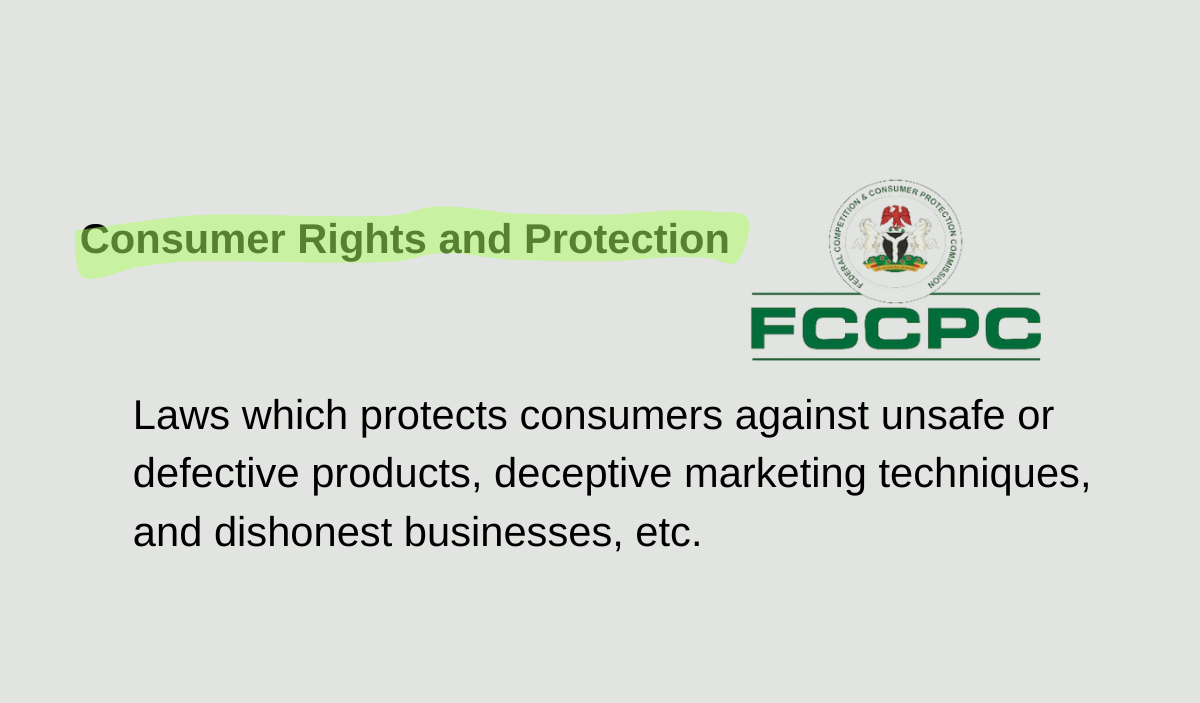
Nigeria: Consumer Rights and Protection Under FCCPC

Under Section 32 of the Federal Competition and Consumer Protection Commission Act, a consumer is any person or group who demands goods, products, or services for consumption as an entrepreneurial or business person provides in large quantities and quality supplies.
However, in Nigeria today, the level of awareness of consumer rights is close to none, except for World Consumer Rights Day marked every year on March 15, but with the joint responsibility of Civil Societies/Consumer Protection Alliances and market regulators, including CBN, EFCC, FRSC, NAFDAC, NBC, NCAA, NCC, NERC, NESREA, NITDA, SON and international and regional partners like the United Nations Conference on Trade and Development (UNCTAD) and United Nations Industrial Development Organisation (UNIDO) to ensure complete coverage on consumer rights and protection, consumer rights and protection visibility tends to increase.
The Government of Nigeria enacted the Federal Competition and Consumer Protection Act, 2018 (FCCP Act) to secure consumer rights. The FCCP Act has copious provisions on consumer rights, particularly Part 15, Section 114-133.
This Sections confers consumers with the following rights:
Rights of a Consumer (Part 15, sections 114-133)
- Right to be given information in plain and understandable language: A consumer is entitled to be given information in a plain and understandable language where such is required to be provided by an undertaking (“this includes a seller, supplier, distributor, importer and a manufacturer”). Whether the information is in plain and understandable language is the reasonable man’s test of the standard of persons to which the information is disseminated.
- Right of disclosure of prices of goods and services: The prices of all goods and services must be displayed clearly so a consumer can notice it. An undertaking must also not require a consumer to pay a price higher than that displayed for the good or service.
- Right to adequate trade description and to have products labelled: A trade description is any description, statement, or indication of the number, quantity, and quality, i.e. of goods. An undertaking is mandated to ensure that trade descriptions are applied to goods either directly, nearby, or by any commercial communication and that they are labelled appropriately for the benefit of a consumer. An undertaking shall not supply a trade description that is misleading or likely to mislead a consumer or which is false.
- Right to the disclosure of second-hand or reconditioned goods: Any person who offers to sell goods that are second-hand or have been reconditioned, rebuilt, or remade must notify the consumer of the nature of the goods.
- Right to be given adequate information about every transaction: A consumer must be provided with a written record of every transaction by the undertaking. This record should contain the business details of the undertaking, the full details of the transaction, tax payable, etc.
- Right not to be given a condition before making a purchase: A consumer must not be given a condition to fulfil first before entering into any transaction with the undertaking or a third party for the supply of goods and services.
- Right to cancel a reservation, booking, or order: The consumer reserves the right to cancel reservations, bookings, or orders for goods and services. The supplier or service provider may require the consumer to pay a fee upon cancellation, but such fee must be fair and not excessive, considering the transaction.
- Right to reject goods before completing the transaction: A consumer has the right to reject goods displayed in open stock before the completion of the transaction.
- Right to goods corresponding with samples and descriptions: Where a consumer cannot examine goods offered by a supplier and the consumer relies on the samples and description provided by the Supplier. Upon delivery of the goods, they must correspond in all material aspects with the sample and description offered by the supplier. This is especially relevant to e-commerce and internet marketing. Goods displayed by vendors must correspond with the goods supplied to the consumer.
- Right to reject goods: A consumer has the right to reject goods in the following instances:-
- Where the goods are intended to satisfy a particular purpose, which is communicated to the supplier, and upon delivery, the goods are not fit for that purpose.
- Where the consumer did not have the opportunity to examine the goods before purchase, for example, in e-commerce and upon delivery, the goods did not match the sample and/or description or did not meet the quality and type envisaged in the sales agreement.
- Where the goods are defective and unsafe.
Where a consumer returns goods in any of these circumstances, the consumer is entitled to a full refund of money paid for the goods.
- Misleading, false, fraudulent, and deceptive information: No producer, importer, distributor, retailer, or service provider shall, in pursuance of trade or to market goods or services to a consumer, make any representation that is misleading, erroneous, fraudulent, or deceptive. Such a person shall also not use physical force, coercion, undue influence, pressure, harassment, etc., to get a consumer to enter into a transaction for goods and services with him or take undue advantage of consumers with physical, mental, or educational disabilities. Any undertaking that violates these rights of a consumer will be liable to the consumer for damages and restitution.
- Right against unfair prices and terms: An undertaking shall not supply, offer to supply, market, or negotiate goods and services to consumers in a manner and/or for prices that are unfair, unreasonable, and unjust. The undertaking shall also not require waiving the consumer’s rights or the consumer assuming the liability of the undertaking or assuming any obligation in a manner that is unfair or unjust.
- Notices detrimental to consumers: Any notice that seeks to limit in any way the risk or liabilities of a supplier of goods or services, constitutes an assumption of risk by the consumer, imposes an obligation on the consumer to indemnify the supplier, or is an acknowledgement of fact by the consumer must be brought to the attention of the consumer in a conspicuous manner and form that a reasonable man won’t miss such a notice and the consumer must be given adequate opportunity to receive and comprehend the notice.
- Right to quality service: A consumer who enters into any transaction for the performance of services has a right to timely performance, quality performance, and completion of the service. The consumer also has a right to the use, delivery, or installation of goods that are free from defects for the performance of the service. If there is any delay in the performance of the service, then the consumer must be given timely notice. Failure of a provider of a service(s) to adhere to these rights of the consumer, the consumer will be entitled to have the defects remedied and a refund of a reasonable portion of the price paid for the service having regard to the extent of the failure.
- Right to safe and quality goods: Every consumer has the right to receive goods that are suitable for the purpose for which they are generally intended (if the consumer has a specific purpose and has informed the supplier, they must be suitable for that purpose), be of good quality, and free from defects. The goods must also be useable and durable for a reasonable period and comply with any applicable standards set by industry sector regulators. There is an implied warranty that all goods and services must comply with these requirements.
Enforcement of Consumer Rights
A consumer whose rights have been violated by any person can either refer the matter to the undertaking for redress or file a complaint in the Federal Competition and Consumer Protection Commission (“the Commission“). The Consumer also has the option of seeking redress in a Court of competent jurisdiction. The Commission has the power to investigate complaints and issue appropriate orders. The Commission can register its orders in the Court as consent orders of the Court.
Here’s an example of a complaint filed by a consumer to the FCCPC and its concluded final report following the investigation.
This article’s content is intended to provide a general guide to the subject matter. If and when you need an expert opinion on specific circumstances, do well to seek one.
Read: Kizz Daniel Marks 10 Years in Music with New EP ‘Thankz Alot’
About The Author
Mayowa Durosinmi
author
M. Durosinmi is a West Africa Weekly investigative reporter covering Politics, Human Rights, Health, and Security in West Africa and the Sahel Region
Mayowa Durosinmi
M. Durosinmi is a West Africa Weekly investigative reporter covering Politics, Human Rights, Health, and Security in West Africa and the Sahel Region
Related Articles
MultiChoice Pumps GH¢200 Million Into Ghana’s Creative Industry
MultiChoice Ghana has invested more than GH¢200 million into the country’s creative...
ByWest Africa WeeklyMarch 5, 2026FIFA Confirms DR Congo Playoff Spot, Ending Nigeria’s World Cup Dream
Nigeria’s hopes of qualifying for the 2026 FIFA World Cup have come...
ByWest Africa WeeklyMarch 5, 2026Ghanaians to Travel to St Kitts and Nevis Without Visa
Ghanaian citizens will soon be able to travel to the Caribbean nation...
ByWest Africa WeeklyMarch 5, 2026Ghana Records Sharp Drop in Inflation, Lowest Since 2021
Ghana’s inflation rate dropped to 3.3 percent in February 2026, marking the...
ByWest Africa WeeklyMarch 5, 2026










